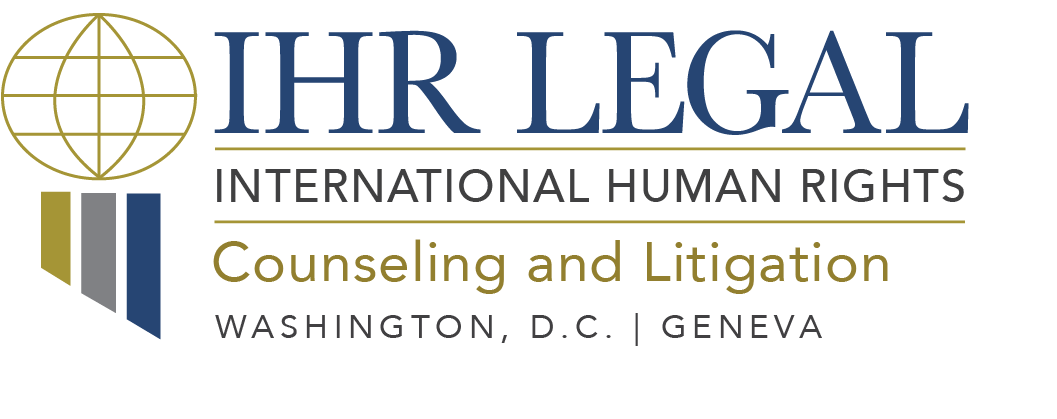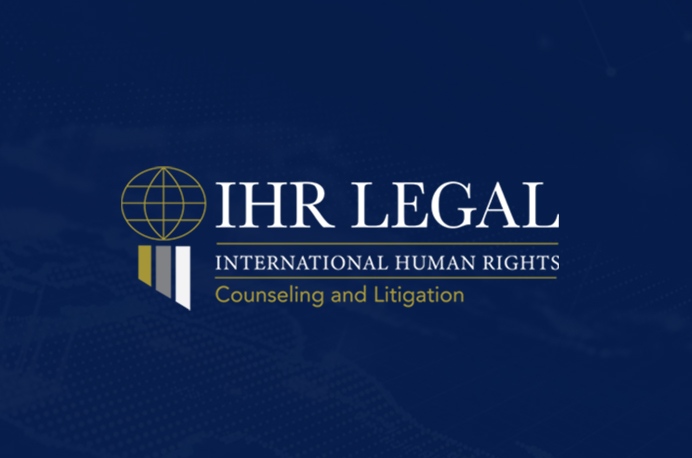
IHR LEGAL Newsletter
IHR LEGAL Newsletter
April – June 2023

In this issue:
Highlights of our latest newsletter
- On June 7, 2023, IHR Legal assisted J.P. and her daughter A.P., a child with hearing loss arbitrarily institutionalized since 2017 in Colombia, in filing a communication and request for provisional measures before the HRC. Due to a decision that declared A.P. adoptable and the fact that the child was never heard throughout the proceedings, the HRC granted the provisional measures, ordering the suspension of the decision, as well as urging the Colombian authorities to guarantee her right to be heard, considering her specific needs.
- On April 21, 2023, the ACHPR issued a statement condemning the bombings in Sudan, caused by the conflict between the Sudanese Armed Forces and the Rapid Support Forces (RSF). The conflict began from the coup that took place in 2021, from which Sudan began to be governed by two military men, who disagree, among others, on the ways in which the country should be governed. Thus, on April 15, days of tension began, with bombings and shootings, which resulted in the death of more than 400 civilians. The ACHPR condemned the violence and pointed out the violation of numerous human rights.
- On May 23, 2023, the ECtHR decided that Bulgaria is internationally responsible for the violation of the prohibition of inhuman and degrading treatment, as well as the prohibition of discrimination, due to the inadequate protection of a 15-year-old victim of domestic violence. A.E., the applicant, was in a relationship with D.M. In 2019, the victim was assaulted by D.M., for which she went to the hospital and the social service, which put her in contact with the Prosecutor’s Office. Despite the facts, the Prosecutor’s Office decided not to open criminal proceedings. The ECtHR found, inter alia, that the physical violence suffered together with intimidation constituted degrading treatment and that Bulgaria failed to consider A.E.’s position of disadvantage as a victim of domestic violence.
- On May 23, 2023, the IACHR published a report on “Human rights of the elderly and national protection systems in the Americas”. The report is the result of the IACHR’s concern for older persons, a group of people who have historically been subject to discrimination. The report covers a range of issues, including the rights recognized in the American Convention on Human Rights, as well as numerous recommendations to States.
Access Previous Issues:
IHR LEGAL Newsletter January – March 2023
– On March 27, 2023, the OHCHR launched a new country report concerning freedom of expression in Yemen. In the report, the OHCHR recalled that the right to seek, receive and impart information and ideas of all kinds is guaranteed to all individuals, without distinction of any kind. In addition, the OHCHR affirmed that freedom of expression also includes a free, uncensored, and unhindered press and media, which are essential in society to ensure freedom of opinion and expression. Regarding Yemen specifically, the OHCHR pointed out that the ongoing conflict in the country has entered its ninth year due to conflict-driven propaganda and disinformation which led to ideological and socio-political conflicts throughout the country. In this sense, the parties to the conflict have characterized critical voices in society as foreign actors who want to threaten national security, which has directly delegitimized the work of journalists and even caused self-censorship. The consequences of this scenario were manifold: many of the journalists who wanted to maintain the integrity of their work left the country, women journalists suffered severe bullying on the internet, and threats, arbitrary arrests, enforced disappearances, and killings continued to be a constant reality in the country.
IHR LEGAL Newsletter October-December 2022
On July 7, 2022, the ECtHR ruled that Italian authorities did not respond with the requisite promptness and diligence in dealing with domestic violence in the case of “M.S. v. Italy”. The applicant, M.S., an Italian national, was assaulted, harassed, and threatened for years by her then-husband, D.P., for which reason she filed several complaints against him. However, the State authorities began to take measures late, for which reason the ECtHR held the State responsible for the period in which it did not take effective measures.
IHR LEGAL Newsletter July-September 2022
On July 7, 2022, the ECtHR ruled that Italian authorities did not respond with the requisite promptness and diligence in dealing with domestic violence in the case of “M.S. v. Italy”. The applicant, M.S., an Italian national, was assaulted, harassed, and threatened for years by her then-husband, D.P., for which reason she filed several complaints against him. However, the State authorities began to take measures late, for which reason the ECtHR held the State responsible for the period in which it did not take effective measures.
IHR LEGAL Newsletter – April – June 2022
HRC decision on violation of human rights of murdered protesters; ACHPR statement on terrorist attack in the Republic of Togo; ECtHR judgment in the Case “Taner Kılıç v. Turkey” for the arbitrary detention of one of the founders of Amnesty International Turkey; and much more.
IHR LEGAL Newsletter – January – March 2022
Statement by the UN High Commissioner for Human Rights, Michelle Bachellet, on Russia’s war crimes and serious violations of international humanitarian law and human rights in Ukraine; ECtHR ruling in the case “Karuyev v. Russia” for a criminal conviction for spitting at a portrait of Putin; IACHR pronouncement on detentions and prosecutions of participants of the July 2021 protests in Cuba; and much more here.
News concerning the universal system and regional systems for the promotion and protection of human rights
I. UNIVERSAL HUMAN RIGHTS SYSTEM
1. Human Rights Committee (HRC)
The Human Rights Committee is the United Nation’s body of independent experts that monitors the implementation of the International Covenant on Civil and Political Rights by its States Parties.
— On June 7, 2023, IHR Legal assisted J.P. and his daughter A.P., a girl with hearing loss arbitrarily institutionalized since 2017 in Colombia, in presenting a communication and request for provisional measures before the HRC. On June 14, 2023, the HRC granted these provisional measures, ordering the suspension of the decision that declared A.P. as adoptable and urging Colombian authorities to guarantee her right to be heard taking into account her specific needs.
The facts of the case started when in September 2017 A.P.’s mother stated to the Colombian Institute of Family Welfare (CIFW) that J.P. was violent with his children. Although there were no signs of physical abuse, based solely on this testimony the CIFW ordered the removal of A.P. from her home and institutionalized her at the Institute for Blind Children, where she remains to this day separated from her family, even though she does not have any visual impairment. Although A.P.’s mother’s testimony was later denied by her, and according to medical exams and a psychologist no evidence suggested physical or sexual abuse, in September 2021 a family court declared A.P. as adoptable. It is to be noted that, throughout all the procedures and interventions, to this day, A.P. was never given a chance to be heard.
Given the above, an individual communication was filed before the HRC, in which it was alleged the violation of the right to protection of the family, the prohibition of arbitrary and illegal interference in the family, and the right to be heard publicly and with due guarantees by a competent, independent and impartial court, to the detriment of A.P. and her father, as well as A.P.’s right to receive protective measures that her condition as a girl requires without any kind of discrimination. In addition, provisional measures were requested in view of the risk of harm that exists as A.P. continues institutionalized, away from her family, and waiting for adoption. The HRC decided to register the communication and issued provisional measures.
2. Committee on the Rights of Persons with Disabilities (CRPD)
The CRPD is the United Nation’s body of independent experts that monitors the implementation of the Convention on the Rights of Persons with Disabilities.
— On April 28, 2023, the CRPD decided that Mexico failed to adopt the necessary measures to ensure that a woman with intellectual disabilities had access to inclusive tertiary education. The author, Mrs. Selene Militza García Vara, was born in 1980 and is a Mexican national. During her birth, she suffered brain damage which interfered with her learning processes. However, the author finished her primary and secondary education with excellent results. She also obtained a Professional Technician Certificate in Fashion Design and applied for a degree in Visual Arts. Even though she met all the requirements for the position, she was not admitted. The dean claimed that there was no budget to be able to carry out the admission of people with intellectual disabilities and that the study plans were not designed for people with disabilities. The author filed several lawsuits which were rejected, which is why she brought her case to the CRPD.
The CRPD decided that there was a violation of Articles 5 (right to equality and non-discrimination) and 24 (right to education), read in conjunction with Articles 4 (general obligations of States), 8 (obligation of awareness-raising), and 9 (right to accessibility) of the Convention on the Rights of Persons with Disabilities because the State did not demonstrate that it had adopted the legislative, administrative, and other measures necessary to guarantee inclusive higher education to the author as a person with intellectual disabilities under equal conditions and without discrimination. In this regard, the CRPD stated that Mexico has failed to meet its obligations by denying reasonable adjustments, which is a prohibited form of discrimination, and which must take place from the moment a person with a disability requires access to situations or environments or wants to exercise his or her rights. In conclusion, the State failed to ensure that the author had general access to higher education, vocational training, adult education, and lifelong learning without discrimination and on equal terms, violating the author’s human rights. The decision (in Spanish) can be found here and the press release here.
II. AFRICAN HUMAN RIGHTS SYSTEM
1. African Commission on Human and Peoples’ Rights (ACHPR)
The ACHPR is a quasi-jurisdictional body, within the framework of the African Union, whose main function is to protect and promote human and peoples’ rights in African countries. Among its functions are to process complaints from individuals or States about human rights violations committed by States in the region, and to receive periodic reports from States on the human rights situation in their country.
— On April 21, 2023, the ACHPR issued a statement strongly condemning the bombings in Sudan, due to the conflict between the Sudan Armed Forces and the Rapid Support Forces. The conflict is framed in the coup of 2021, since which Sudan has been ruled by two military men: General Abdel Fattah al-Burhan, who is the head of the Armed Forces and president of the country, and General Mohamed Hamdan Dagalo, who is the deputy and leader of the Rapid Support Forces (RSF). However, they disagree on the direction the country is headed and the main point of disagreement is the plan to include 100,000-strong RSF for the army and who would command the new force. As a result, shooting and bombings began on April 15, after days of tension following the redeployment of RSF members throughout the country, a measure that the army considered a threat. According to the available data, more than 400 civilians were killed. Faced with these facts, the ACHPR condemned the indiscriminate acts of violence that are violating several human rights, including threats to the life, liberty, and property of civilians throughout the country.

Image source: The Arab Weekly, “Risk of all-out army-RSF confrontation spurs mediation in Sudan”, available at: https://thearabweekly.com/risk-all-out-army-rsf-confrontation-spurs-mediation-sudan
The ACHPR expressed its deep concern with the various human rights violations, which caused psychological trauma to civilians, destruction of homes, obstacles to access to health care for the sick and injured, and sexual violence against girls and women by the parties’ officials, among others. Ultimately, it called for an end to hostilities and for humanitarian access to be given to all those in need. The press release can be found here.
III. EUROPEAN HUMAN RIGHTS SYSTEM
1. European Court of Human Rights (ECtHR)
The ECtHR is a judicial body of the Council of Europe whose main function is to monitor the compliance of States parties with the European Convention for the Protection of Human Rights and Fundamental Freedoms (ECHR). The ECtHR is responsible for analyzing complaints from individuals, groups of individuals, or States for human rights violations committed by States that have accepted the ECtHR’s jurisdiction.
— On May 23, 2023, the ECtHR found that the prohibition of inhuman and degrading treatment and the prohibition of discrimination were violated due to the inadequate protection of a 15-year-old domestic violence victim in Bulgaria. A.E., the applicant in the case, is a national of Bulgaria and was born in 2004. In 2018, she started living with D.M., a 23-year-old man who regularly beat her. In September 2019 she suffered an attack by D.M. and as a result, she ran away and went to the hospital seeking medical help. At that time, she was found to have severe bruises, in addition to other injuries. Upon these facts, A.E.’s mother went to the social service, and from there they contacted the Prosecutor’s Office. On this occasion, a description of the circumstances and of several other attacks that A.E. had suffered from D.M. were included. However, D.M. denied such facts. Later in 2019, the prosecutor decided not to open criminal proceedings. A.E. appealed the decision, but the Prosecutor’s Office declined it because there was no evidence that her life was in danger or that she had lived as a couple with D.M.
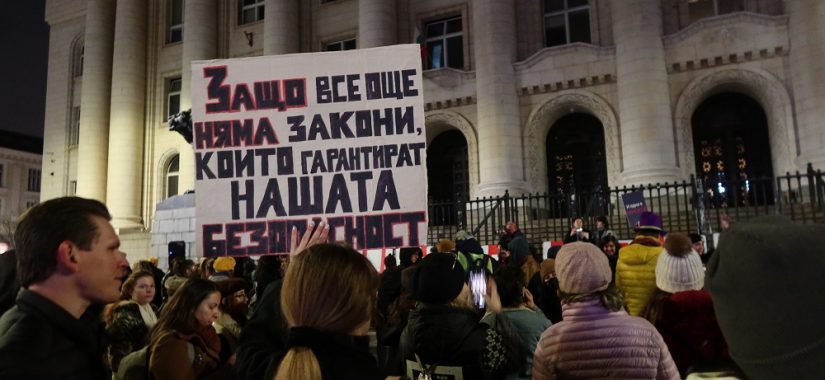
Image source: Bulgarian Fund For Women, “The Fight Against Domestic Violence in Bulgaria: A Chance for Real Progress or Another Missed Opportunity”, available at: https://bgfundforwomen.org/en/2022/07/25/lpdv-chance-or-missed-opportunity/.
Initially, the ECtHR found that the physical violence to which A.E. was subjected, combined with the intimidation and stress she experienced, qualified as degrading treatment. On the other hand, the ECtHR found that the State did not comply with its obligation to respond immediately to allegations of domestic violence with due diligence and that there was also a refusal by the national authorities to classify the attacks as domestic violence on the grounds that the couple’s relationship did not meet the legal definition. Consequently, the ECtHR decided that there was a violation of Article 3 (prohibition of torture or inhuman or degrading treatment or punishment) and Article 14 (prohibition of discrimination) of the ECHR, given that, as a woman victim of domestic violence in Bulgaria, A.E. was placed in an unequal position that required the authorities to address the disadvantage associated with her sex in that context, which Bulgaria omitted to do. Consequently, the ECtHR found a violation of Article 14 (prohibition of discrimination) of the Convention. The press release can be found here and the judgment here.
— On May 2, 2023, the ECtHR decided that Bulgaria violated a parliamentary election candidate’s right to freedom of expression by being penalized for speaking in Turkish while conducting his campaign. Mr. Lyutvi Ahmed Mestan, the applicant in the case and a Bulgarian national of Turkish origin, was chairman of the Movement for Rights and Freedoms, a political party which, at the time of the facts, was supported by Turkish minority voters in Bulgaria and had 36 seats in the Bulgarian National Assembly. Based on an outdoor rally event that occurred on May 5, 2023, in which the applicant spoke in Turkish for seven minutes, the Sliven Regional Governor found that such speech in another language violated the Electoral Code. The Regional Governor, therefore, claimed that there was a threat to public order since the applicant was the chairman of a political party, for which reason he imposed a fine.
The ECtHR ruled that there was a violation of Article 10 (right to freedom of expression) of the ECHR because, on the one hand, the nature of the absolute prohibition on the use of any language other than the official (Bulgarian) in election campaigns effectively disempowered the national courts to exercise legal scrutiny. On the other hand, the ECtHR also argued that although States have the right to regulate the use of language concerning some aspects of communication with the public, to carry out a total ban on the use of non-official languages, in addition to the imposition of sanctions, is not compatible with the fundamental values of a democratic society, including the right to freedom of expression. The ECtHR recalled that the language used by the applicant in the case was his mother tongue and also the language of the minority population he was communicating with since it considered that the right to demonstrate one’s political views and ideas and the right of others to receive them would be senseless if the possibility of using a language that could show one’s ideas was undermined by the threat of a sanction. Finally, the ECtHR highlighted the indispensability of pluralism, tolerance, and protection of minorities in a democratic society, stressing that respect for minorities “far from weakening democracies, could only make them stronger”. The press release can be found here.
IV. INTER-AMERICAN HUMAN RIGHTS SYSTEM
1. Inter-American Commission on Human Rights (IACHR)
The IACHR is the autonomous body of the Organization of American States responsible for the promotion and protection of human rights in the Americas. One of its duties is to receive and review complaints from individuals for human rights violations and to monitor human rights situations in the States members.
— On May 23, 2023, the IACHR launched the report “Human rights of the elderly and national protection systems in the Americas”, in which it reaffirmed that aging constitutes just another stage in people’s life cycle, valuable and dignified in itself. One of the concerns mentioned by the IACHR that justified the publication of the report was the human rights situation of older persons, who are a group of people who have historically been subjected to discrimination and are therefore victims of repeated patterns of human rights violation. The report is divided into five major chapters and the topics addressed include the Inter-American Human Rights System in relation to the human rights of older persons, the national systems for the protection of the rights of adults in the Americas, the rights of older persons recognized in the American Convention on Human Rights, and several recommendations to the States, including that States should adopt measures to promote a cultural change that eliminates ageism (discrimination based on age) and that they should promote intergenerational activities that bring older people closer to younger generations. The report can be found here and the press release here.
— On May 3, 2023, the IACHR released the report “Situation of Human Rights in Peru in the Context of Social Protests”, addressing the context of the democratic and social institutional crisis affecting the country. The report covers the period between December 7, 2022, when social protests with political and economic demands began, and January 23, 2023. The report begins approaching the legal framework that delimits Peru’s obligations, both concerning the constitutional system, as well as its international obligations, since it is a party to the American Convention on Human Rights, among other treaties.
The IACHR recalled that the protests took place in a marked context of historical discrimination based on ethno-racial origin and economic situation, which is manifested in different aspects, such as the insufficient political representation of rural communities, peasants, indigenous peoples, and Afro-descendants. In the report, the IACHR addressed several issues that also contributed to democratic instability in the country, such as the ongoing polarization, the unproven accusations of electoral fraud as well as the confrontation between public authorities. From these events and the protests emanating from such circumstances, there were many human rights violations, including the rights to life and personal integrity, the right to health, personal liberty, the right to protest, the right to freedom of the press, and the right to defend human rights. In this regard, the IACHR emphasized that the State failed to comply with various obligations, such as the obligation to investigate, prosecute and punish human rights violations, the duty to guarantee peaceful protests, and the duty to not criminalize leaders and participants in demonstrations and protests.
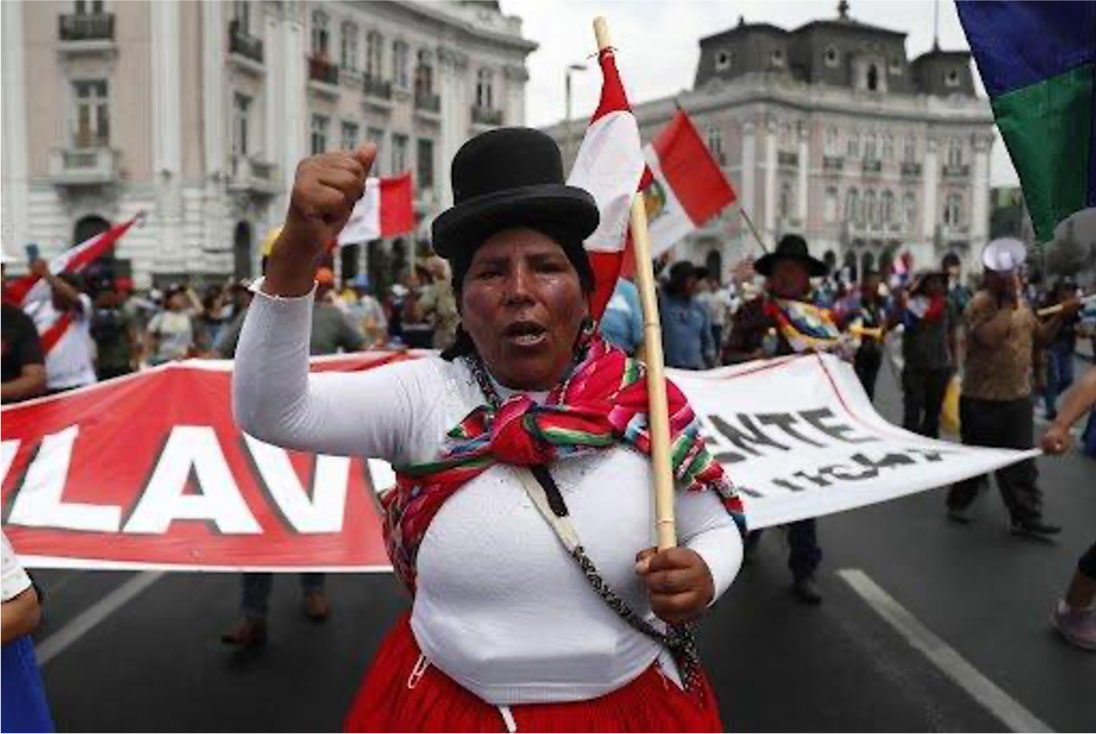
Image source: Carolina Political Review, “Democracy and Discontent: Crisis in Peru”, available at: https://www.carolinapoliticalreview.org/editorial-content/2023/3/8/democracy-and-discontent-crisis-in-peru
In its conclusions, the IACHR recommended the State to implement a strategy of genuine dialogue that allows all sectors and levels of the political and administrative division to be heard, and that it adopts a permanent and mandatory training and evaluation plan for the security forces involved in the development of demonstrations and protests. The report (in Spanish) can be found here and the press release here.
— On April 5, 2023, the IACHR and the Special Rapporteurship on Economic, Social, Cultural, and Environmental Rights (REDESCA) published its latest report on “Labor and Union Rights in Cuba” to bring to light the human rights violations faced by workers in the country. After the publication of the last report “Human Rights Situation in Cuba”, the IACHR found that the situation in the country was aggravated by even more obstacles, particularly regarding the consequences and effects of the protests of July 11, 2021, which was the largest national demonstration against the government since the Cuban Revolution of 1959. The IACHR stated that, since the demonstrations, repression against dissent in the country has increased and there have been major human rights violations of the population, such as the existence of a systematic pattern of criminalization and persecution of peaceful demonstrators, activists, and political opponents, through arbitrary arrests and criminal proceedings that do not observe the minimum guarantees of due legal process. This represents one of the many problems the country is facing.
The report is divided into seven chapters. The first chapter provides the introduction with its background and objectives, as well as Cuba’s relationship with the IACHR. The second chapter addresses the human rights context in Cuba, including democratic institutionality, the repression of dissent, the massive exodus of Cuban people from the country, and economic, social, cultural, and environmental rights. The third chapter deals specifically with labor rights and addresses issues such as the conventions ratified by Cuba, internal regulations on labor rights, labor market data, and the situation of labor rights in Cuba (which includes precarious working conditions, harassment, discrimination, lack of freedom of expression in these contexts, among others). The fourth chapter focuses on trade union rights, including the main violation patterns, the non-existence of freedom of association in the labor field, the right to collective bargaining, and the lack of real participation of working people, among others. The fifth chapter addresses access to justice, due process, and judicial protection, highlighting all the challenges related to these issues. The sixth chapter refers to business and human rights in Cuba. Finally, the last chapter exposes some conclusions and recommendations. The report (in Spanish) can be found here and the press release here.
2. Inter-American Court of Human Rights (IACtHR)
The IACtHR is a regional human rights court responsible for applying and interpreting the American Convention on Human Rights and other human rights instruments in the region. Its main function is to decide cases on human rights violations committed by States that have accepted its jurisdiction.
— On April 11, 2023, the IACtHR found that Peru was internationally responsible for the discrimination of a gay couple. In August 2004, Mr. Chrisstian Manuel Olivera Fuentes and his then same-sex partner were in a coffee shop located in the Santa Isabel de San Miguel Supermarket in the city of Lima, Peru. Due to their display of affection, a customer of the establishment went to complain to the manager of the supermarket, claiming that he was uncomfortable. The manager, along with the security personnel, addressed the couple and expressed that they should refrain from any affection demonstration so as not to disturb the clients, or else they should leave the establishment. Therefore, Mr. Olivera filed several complaints and lawsuits, which were rejected. lawsuits which were rejected, which is why she brought her case to the CRPD.
The IACtHR stated that to eliminate all types of discriminatory practices and attitudes and achieve material equality, the involvement of the entire community, and particularly the business sector, is essential. Consequently, companies must respect the rights of LGBTIQ+ people not only in the work environment but also in their commercial relations through the supply of products and services. Likewise, the Court pointed out that the administrative resolutions appealed to social prejudices about affective acts performed by a gay couple and their alleged impact on other people, discriminatory reasons, which denied them access to an impartial body that would analyze the complaint according to the Inter-American standards of due process. All of this also had an impact on the right to personal freedom and private life, which caused a violation of Articles 7.1 (right to personal liberty), 8.1 (right to a fair trial), 11.2 (right to privacy), 24 (right to equal protection) and 25.1 (right to judicial protection) of the American Convention on Human Rights. The decision (in Spanish) can be found here and the press release here.
Access Previous Issues:
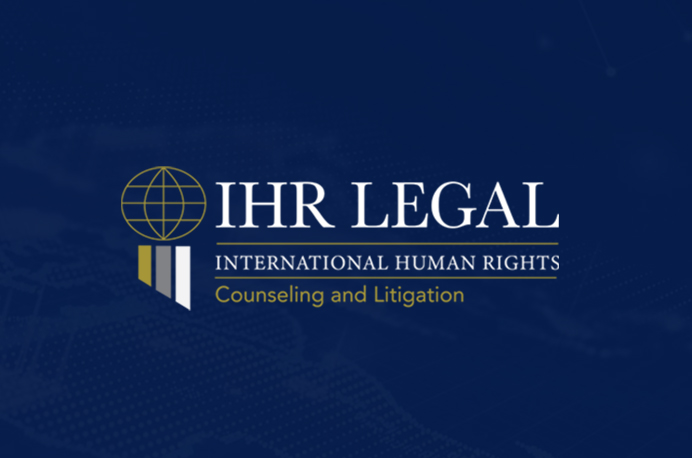
IHR LEGAL Newsletter – April to June 2021
Joint Statement on the eve of the International Day against Homophobia, Lesbophobia, Biphobia and Transphobia; Statement by UN High Commissioner for Human Rights, Michelle Bachelet, on the increase of human rights violations and abuses in Mali; Statement by the African Commission on Human and Peoples’ Rights on the occasion of the International Day in Support of Victims of Torture; and much more here.

IHR LEGAL Newsletter – January to April 2021
Statement on the George Floyd case by UN High Commissioner for Human Rights, Michelle Bachelet; IACHR Resolution on “COVID-19 vaccines in the framework of Inter-American Human Rights obligations”; African Commission on Human and Peoples’ Rights Resolution on the excessive use of force by agents of African States; and much more here.
